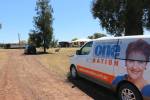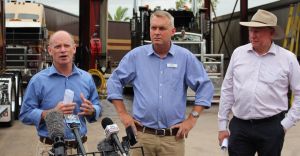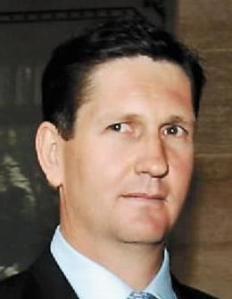Blog Archives
Last Week in Queensland – 13 March 2017
 Opposition Leader Tim Nicholls built better media coverage, until former Premier Newman crashed it for him, while the Government released their plan to fix Queensland Rail, last week in Queensland*.
Opposition Leader Tim Nicholls built better media coverage, until former Premier Newman crashed it for him, while the Government released their plan to fix Queensland Rail, last week in Queensland*.
Governing
- Proposed subcontractor protections criticised by industry www.couriermail.com.au/news/queensland/palaszczuk-governments-building-reforms-come-under-fire-from-construction-industry-peak-bodies/news-story/8865be7fc751032f85491b12b6c18184
- How much are Ministerial offices costing? www.brisbanetimes.com.au/queensland/queensland-ministerial-offices-spent-more-than-17-million-in-six-months-20170310-guv551.html
- Government releases action plan to fix Queensland Rail www.news.com.au/national/breaking-news/new-queensland-rail-boss-named/news-story/7ff86e59dd1cac1652b16e8bfdfd1b57 and www.brisbanetimes.com.au/queensland/fixing-the-trains-what-will-happen-in-first-100-days-of-govt-strike-plan-20170308-guthqt.html
- Stock route management proposals to be amended? www.abc.net.au/news/2017-03-09/government-told-to-go-back-to-the-drawing-board-on-stock-routes/8339530
- Premier’s trade mission to Singapore and Europe www.9news.com.au/national/2017/03/09/03/33/qld-premier-off-to-london-to-see-the-queen
Opposition and Crossbench
- Tim Nicholls’ plan to lead www.couriermail.com.au/news/queensland/queensland-government/tim-nicholls-five-priorities-six-key-drivers-fivepoint-plan-to-lead/news-story/ba22a90a6d5c49dee389f5cd28a58e81 and http://thewest.com.au/politics/nicholls-makes-case-to-be-next-qld-premier-ng-s-1688232
- Liberal-National Party’s Townsville forum www.townsvillebulletin.com.au/news/opposition-leader-wants-all-voters-to-have-a-say-at-forum-in-townsville/news-story/2d5df6e6e96ea8603786ca7fc9976b68
- Former Premier won’t let Tim Nicholls off the hook for past policy leadership www.theguardian.com/australia-news/2017/mar/08/campbell-newman-hits-back-as-tim-nicholls-says-sorry-for-mistakes-of-the-past and www.sbs.com.au/news/article/2017/03/08/qld-leaders-pitch-voters-ahead-poll
Politics
- Western Australia election fallout, relevant to Queensland?
- … Should the Liberal-National Party do a deal with One Nation Party? www.watoday.com.au/wa-news/liberals-poorly-misjudged-the-anger-with-voters-over-its-deal-with-one-nation-20170312-guw8ug.html
- … GST policy pronouncements could hurt One Nation Party in Queensland www.skynews.com.au/news/politics/state/2017/03/09/hanson-criticised-for-qld-gst-stance.html
- … has One Nation or Pauline Hanson matured? www.couriermail.com.au/news/opinion/party-games-who-said-pauline-hanson-had-matured/news-story/950c775018db8ab264c5acfcf4707a47
- … One Nation Party deals criticised by LNP elder statesman www.theguardian.com/australia-news/2017/mar/07/voters-will-desert-coalition-if-deals-done-with-one-nation-former-nationals-senator-warns
- … Is One Nation still viable in Queensland? www.brisbanetimes.com.au/queensland/one-nation-still-viable-in-queesland-experts-20170312-guw9u1.html
- Government attacks Murdoch media and Liberal-National Party for renewables scare tactics http://reneweconomy.com.au/queensland-govt-slaps-lnp-murdoch-renewable-scares-43765/
- Liberal-National Party won’t change Queensland leadership, say insiders www.couriermail.com.au/news/queensland/queensland-government/tim-nicholls-will-lead-lnp-to-next-election-says-senior-insider/news-story/79a2f3d151e39bab6998f553d7fafa58
Economy and Infrastructure
- Townsville: stadium vs. water supply http://queenslandeconomywatch.com/2017/03/07/townsville-getting-250m-super-stadium-but-running-out-of-water/
- Big international performers boosting the Queensland economy www.couriermail.com.au/news/queensland/international-acts-bring-big-bucks-to-queensland-economy/news-story/1d85c3e32642d27e95649221a4ba802e
- Penalty rates protests closed dozens of building sites www.couriermail.com.au/news/queensland/unions-illegal-protest-against-penalty-rate-cuts-cost-queensland-economy-8-million/news-story/470e257244e94a94d2fd15bf068b923d
- … as the Liberal-National Party labels Queensland Australia’s “strike capital” http://au.news.yahoo.com/qld/a/34613814/qld-the-strike-capital-of-australia-lnp/
- Gas exploration domestic reservation policy seen as positive www.afr.com/business/energy/gas/energyaustralia-backs-qlds-domestic-exploration-move-20170309-guufqb
- … anticipating future gas shortages www.theaustralian.com.au/business/mining-energy/power-shortage-states-should-consider-queensland-gas-solution/news-story/c0c0ff62be1feb2f4b3d5385b676a2bd
- Government labels new coal fired power stations irrational www.couriermail.com.au/news/queensland/queensland-government/new-coalfired-power-stations-for-queensland-not-rational-state-government-says/news-story/ed92e8a3cbc0af7e4045933a09d69a5c
- Great Barrier Reef might yet be listed as “in danger” www.theaustralian.com.au/national-affairs/queensland-to-plead-over-unesco-in-danger-listing-for-great-barrier-reef/news-story/47c0e70a3b987b82341a33aede07c019
- … as Government releases proposals for enhanced protection www.couriermail.com.au/news/queensland/state-moves-to-improve-great-barrier-reef/news-story/b419a0d10fce5a1fff759fef2c1e99f4
- “Experts” continue to urge Queensland public asset sales http://sourceable.net/expert-urges-queensland-to-sell-assets-to-fund-infrastructure/
- Can the Gold Coast’s Spit project be completed? www.goldcoastbulletin.com.au/news/gold-coast/main-beach-residents-call-on-premier-annastacia-palaszczuk-to-ensure-gold-coast-subbies-wont-be-placed-in-financial-difficulty/news-story/88cef3cca7f359ab4bf8bb1615782bed
- Large-scale solar projects moving forward http://reneweconomy.com.au/queensland-govt-underwrites-98mw-of-large-scale-solar-farms-13862/
Parliament
- Queensland’s Parliament will next sit from Tuesday 21 March to Thursday 23 March
- The Queensland Parliament’s summary of what’s new, including newly-introduced and passed legislation, is here www.parliament.qld.gov.au/work-of-assembly/whats-new
- Both chambers of the Federal Parliament next sit from Monday 20 March to Thursday 23 March
Sleeper Issues?
- Strata Law review won’t be simple or tidy www.couriermail.com.au/news/queensland/opinion-queensland-strata-law-review-must-consider-rights-of-the-vulnerable-elderly/news-story/477fd627aed6d81287c897a0e2aaa7db
- Parliamentary email used for fundraising www.couriermail.com.au/news/queensland/queensland-government/second-email-fail-electorate-letterhead-used-to-solicit-funds/news-story/86ea34a0448b17500c11db246dd612ad
* We’re not representing that this is a complete coverage of news in Queensland – it certainly isn’t, and it’s what we find interesting or important, and sometimes what’s unusual. Some of the links will require subscriptions to read content.
Queensland Election: Liberal National Party Review Released
On January 31, 2015, Queensland’s Liberal National Party lost State Government by a small margin, after having taken Government in 2012 with a record swing and a huge majority in the Queensland parliament.
Today the LNP released their review of what went wrong for them, and you can download it here: http://lnp.org.au/election-review/.
It is too soon to review the Report in depth but it finds, inter alia:
“The overwhelming election win of 2012 led to hubris and a false sense of security consolidating an energetic and reformist government leadership team but without parliamentary experience. The huge influx of inexperienced new MP’s and a leader without parliamentary background contributed to a lack of corporate history in the conduct of parliament and the party room.
“Broad based disappointment has been expressed with the campaign and the election defeat. Undoubtedly, the leadership of the government contributed to the election loss including:
- the breaking of the promise that public servants had ‘nothing to fear’;
- the perception of arrogance arising from not listening to the people;
- pursuing the large scale privatisation of assets to which the majority of voters opposed or had serious reservations;
- the alienation of key stakeholders in the decision making process; and
- the two year discordant relationship with the organisational wing.
“The campaign itself, the responsibility of the central campaign committee had inherent problems such as failing to:
- address the perception of the Government’s arrogance and to turn this weakness into strengths;
- promote the government’s considerable achievements in fixing “labor’s mess’ and growing the state’s economy;
- launch an attack program to rebut the deceitful and untruthful propaganda of the party’s opponents;
- engender confidence with local campaign committees; and
- manage the expectation that the party with its large majority would hold government at the poll.”
The Report makes 39 recommendations:
- The Borbidge Sheldon review report and recommendations must be released to party units at the same time it is given to the state executive and made public thereafter.
- The review committee notes the actions taken by the parliamentary party to address the lessons learned from the 2015 election defeat.
- The review committee notes the over-riding need to improve the relationship between the parliamentary and organisational wings of the party and recommends:
- The parliamentary party members retain the right to select their leader from within their own ranks.
- A compact be established to define the relationship between the parliamentary and organisational wings of the party.
- That the compact be prepared by a party member nominated by the parliamentary leader who should be a previous parliamentary leader of the LNP, the liberal party or the national party, a party member nominated by the state president who should be a former president of the LNP, the liberal party or the national party and one other, jointly nominated by both.
- That the compact be agreed to by the parliamentary party and the state executive and signed by the parliamentary leader and the party president.
- That the state executive address as an urgent priority meaningful connectivity and communications with the grassroots membership.
- That the LNP Integrity Paper should be updated and implemented and all candidates should be required to acknowledge and accept its requirements. That the LNP in government or opposition be required to adhere to the principles which include:
- broken promises will not be tolerated by the public;
- corruption and lack of accountability will not be tolerated;
- the institutions of state must be respected.
- That major policy issues proposed by the parliamentary party where possible be subjected to debate at either the state council or the state convention or, if found to be urgent, be considered by the president’s committee/state executive for comment.
- That a party platform detailing the party’s principles and policies be finalised for distribution to members as a matter of urgency.
- That the president and the state director, in the LNP Annual Report indicate that the administrative, organisational, financial and policy responsibilities as required under the LNP’s constitution has been complied with.
- That the central campaign committee be restructured to include party policy and decentralised representatives as determined by the president and parliamentary leader.
- The position of campaign director should be separate from the state director and report to the state president.
- The review committee notes that a limited number of federal issues impacted adversely on the state campaign, in particular the controversy over the awarding of knighthoods, the GP co-payment and the defence pay issue and recommends:
- That close consultation be establish between the central campaign committee and the federal leadership to minimise adverse impacts on state campaigns of federal issues and that a liaison unit be established between central headquarters (CHQ) and the federal leader’s office.
- That a central campaign strategy allow increased decision making for local campaigns.
- That state elections be avoided during the month of January as it is a recognised holiday period.
- The review committee notes with concern:
- The absence of a marginal/target seats campaign at the 2015 state election and recommends that the strategy be reinstated for future state elections,
- the absence of a negative advertising campaign, the want of the central campaign committee to exploit the weaknesses of the prime opponent, and
- the lack of third party endorsements in support of the party’s policies and actions in the campaign.
- It is recommended that such strategies be included in future state election campaigns.
- Sitting MPS, recontesting the poll should be permitted to handle PVA’s for his/her electorate, whilst candidates PVAs should be managed by the central campaign.
- It is essential that booth advertising material should arrive prior to prepolling; booth signs should be of a size that enables them to be easily and safely transported.
- The centralised banking system and the campaign funding/ budgeting process should be reviewed specifically to provide party units with increased financial control and campaign committees with the latitude to make funding decisions – whilst maintaining the link to CHQ budget/systems/agreements. It recommended that:
- That the treasurer report to state convention or council, as a matter of urgency, on measures that can be implemented to provide SEC’s with greater responsibility for their funds and budgets.
- The Just Vote 1 strategy should be reviewed to ensure that it is applicable to the political and election circumstances.
- The review committee notes the enhancements to the applicant review process for the endorsement of candidates and recommends that the processes be monitored to ensure they are robust to meet any issue that may emerge.
- Plebiscites should be the preferred method for the selection of candidates.
- That the CHQ organisational structure be reviewed to improve efficiency with emphasis on communications, policy development, membership services and the delivery thereof.
- That the gender balance of the state executive be a consideration of members when electing persons to roles on this body.
- That all appointments made by the state president or the state executive be subject to confirmation by state council.
- That the composition of the president’s committee be widened to include the parliamentary leader or his nominee.
- That members of state executive recognise the responsibilities associated with their dual roles of governance and communications to and from party units and ensure they act as conduits of information.
- That a membership customer relations manager be appointed.
- A permanent strategic research office should be established in CHQ to undertake electorate and policy research.
- A membership development strategy should be developed to grow the membership which should include the introduction of online membership applications.
- A new category of family membership should be introduced.
- State convention or state council resolutions be categorised to reflect the three levels of government so that the responsible minister/shadow/councillor or other office holder may be present for the duration of the debate.
- State convention and state council attendance by the parliamentary leader and members of parliament be required unless in extenuating circumstances.
- Meetings of the LNP state council and state convention and shadow cabinet meetings should be held, where practicable in regional centres as well as the capital city.
- That ministers/shadows meet regularly with party policy chairs and their committees and attendance or otherwise conveyed to the parliamentary leader and the state president.
- That CHQ prepare a data base of membership expertise as a resource for MP’s and policy committees.
- That the LNP establish an independent review of its social media strategy and its effectiveness compared to our political opponents.
- That social media training should be introduced for MP’s, senior staff and party members.
- That an ongoing social media strategy be developed.
- That members of parliament and candidates not be directly involved in the soliciting of funds.
- That the LNP consider the full public funding of election campaigns and the banning of trade union and corporate donations.
New Queensland LNP Opposition Front Bench
Queensland Liberal National Party Leader Lawrence Springborg has announced the new Opposition front bench and leadership team, on Friday 20 February 2015.
- Opposition Leader: Lawrence Springborg;
- Shadow Treasurer and Shadow Minister for Commonwealth Games: John-Paul Langbroek;
- Shadow Minister for Environment, Heritage Protection and National Parks: Stephen Bennett;
- Shadow Minister for Police, Fire, Emergency Services and Corrective Services: Jarrod Bleijie;
- Shadow Minister for Natural Resources and Mines, State Development and Northern Development: Andrew Cripps;
- Shadow Minister for Communities, Child Safety and Disability Services: Tracy Davis;
- Shadow Minister for Transport: Scott Emerson;
- Shadow Minister for Agriculture, Fisheries and Forestry: Deb Frecklington;
- Shadow Minister for Education & Training: Tim Mander;
- Shadow Minister for Health: Mark McArdle;
- Shadow Minister for Science, Information Technology and Innovation: John McVeigh;
- Shadow Minister for Housing and Public Works: Rob Molhoek;
- Shadow Minister for Infrastructure, Planning, Small Business, Employment and Trade: Tim Nicholls;
- Shadow Minister for Energy and Water Supply: Andrew Powell;
- Shadow Minister for Local Government and Main Roads, Community Recovery and Resilience: Fiona Simpson;
- Shadow Minister for Aboriginal and Torres Strait Islander and Multicultural Affairs: Tarnya Smith;
- Shadow Minister for Tourism, Major Events, Sport and Racing: Jann Stuckey;
- Shadow Attorney-General and Shadow Minister for Justice, Industrial Relations and Arts: Ian Walker;
- Shadow Assistant Minister Assisting the Opposition Leader in North Queensland: Jason Costigan;
- Leader of Opposition Business: Ray Stevens;
- Chairman of the Parliamentary Policy Committee, Strategy and Coordination: Jeff Seeney;
- Whip: Ian Rickuss; and
- Deputy Whip: Steve Minnikin.
The Liberal National Party has chosen to not match the Ministerial portfolios in the new Palaszczuk Government, which is an uncommon tactic in Australian politics. They say 14 Ministers is too few and some Ministers will be overloaded. Unlike their previous Newman Government, and matching the Palaszczuk Government, they have appointed one Assistant Minister only.
Former Minister for National Parks, Recreation, Sport and Racing Steve Dickson and former Minister for Aboriginal and Torres Strait Islander and Multicultural Affairs Glen Elmes are no longer on the front bench; former Deputy Premier, and Minister for State Development, Infrastructure and Planning Jeff Seeney has been given the new role of chair of the LNP’s parliamentary policy committee, strategy and co-ordination.
Several former Newman Government ministers have kept the same portfolios they had as Ministers, which might be expected to give the Opposition a political edge, as new Labor Ministers work to get across their portfolios. Several Assistant Ministers in the Newman Government are now Shadow Ministers in Opposition.
New faces in the Shadow Ministry:
- Shadow Minister for Environment, Heritage Protection and National Parks: Stephen Bennett;
- Shadow Minister for Agriculture, Fisheries and Forestry: Deb Frecklington (previously an Assistant Minister);
- Shadow Minister for Education & Training: Tim Mander (previously an Assistant Minister);
- Shadow Minister for Housing and Public Works: Rob Molhoek (previously an Assistant Minister);
- Shadow Minister for Local Government and Main Roads, Community Recovery and Resilience: Fiona Simpson (previously Speaker);
- Shadow Minister for Aboriginal and Torres Strait Islander and Multicultural Affairs: Tarnya Smith (previously an Assistant Minister); and
- Shadow Assistant Minister Assisting the Opposition Leader in North Queensland: Jason Costigan.
You can compare the current team with Campbell Newman’s 2012 team, here, not forgetting there were a couple of mid-stream changes.
The Queensland Parliament has now restored Member of Parliament biographies, post-election, and you can find them here.






